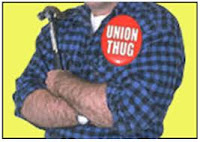It was business, not labor, that initiated the policy of government intervention in the economy (as long ago as the nineteenth century)—
and business was the first victim. Labor adopted the same policy and will meet the same fate. He who lives by a legalized sword, will perish by a legalized sword.
The artificially high wages forced on the economy by compulsory unionism imposed economic hardships on other groups particularly on non-union workers and on unskilled labor, which was being squeezed gradually out of the market. Today’s widespread unemployment is the result of organized labor’s privileges and of allied measures, such as minimum wage laws.
For years, the unions supported these measures and sundry welfare legislation, apparently in the belief that the costs would be paid by taxes imposed on the rich. The growth of inflation has shown that the major victim of government spending and of taxation is the middle class.
Organized labor is part of the middle class
and
the actual value of labor’s forced “social gains”
is now being
wiped out.
Organized labor has been much more sensitive to the danger of government power and much more aware of ideological issues. Its spokesmen have fought the government in proper, morally confident terms whenever they saw a threat to their rights. Labor’s concern was aroused only in defense of its rights; still, whoever defends his own rights defends the rights of all.
But labor was pursuing a contradictory policy, which could not be maintained for long. In many issues notably in its support of welfare-state legislation labor violated the rights of others and fertilized the growth of the government’s power.
And, today, labor is in line to become the next major victim of advancing statism.
Ayn Rand : “The Moratorium on Brains,”



